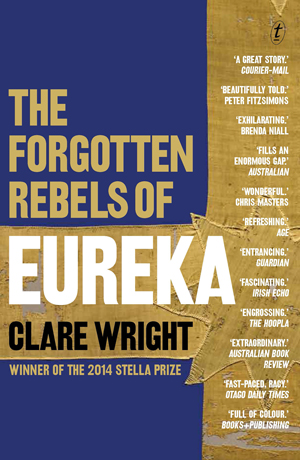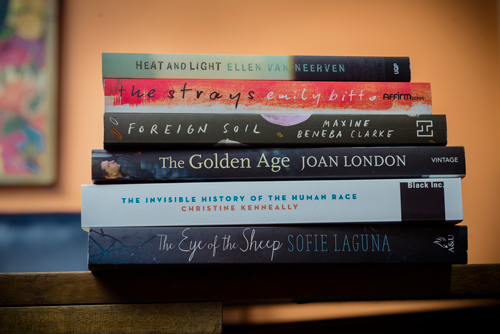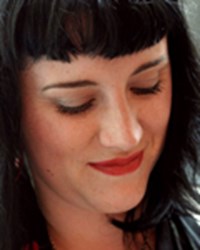Issue 93
Term 2 2015
Reading like a girl
Bec Kavanagh, Coordinator for the Stella Prize Schools Program, looks at the unconscious gender bias present in the literary world, and how the Stella Prize Schools Program is trying to combat this.
You've probably seen it, the 'Always' advertisement that sparked the #likeagirl hashtag across social media, and inspired a wave of debate following its viewing at the Superbowl in 2015. For anyone that hasn't, let me just recap.
Young women are stood in front of a camera, and asked to do a series of activities 'like a girl'. Run like a girl. Fight like a girl. Hit like a girl. They respond predictably, performing the stereotype of 'girly' behaviour – slapping, hand-waving, typically weak and effeminate.
Young girls are then placed in front of the same camera and asked to do the same activities, again, 'like a girl'. When asked to run like a girl, they run. When asked to hit like a girl, they hit. When asked if doing something 'like a girl' is a good thing or a bad thing, they all have the feeling that it might be bad, but none are sure why.
The older girls watch this. They're given the chance to repeat their actions. They run. They fight. They hit. They ask why doing something 'like a girl' can't also mean winning the race.
This clever marketing campaign has tapped into something that has been underpinning our culture for years – unconscious gender bias. Put simply, this is the favouring of one gender over another, typically male over female.
In the literary world this translates as a greater number of men winning major literary prizes, a greater number of books by men being reviewed in our major publications (and more frequently by male critics), and the majority of texts studied at secondary level being written by male authors. The result of this is that girls aren't seeing the full range of their experiences in literature. They see a smaller range of opportunities available to them. Both girls and boys are presented with much narrower options of who they can be based on their gender.
Dreams of the Stella Prize emerged in early 2011, out of a panel held on International Women's Day. The panel was partly a discussion about the under-representation of women on the literary pages of the major Australian newspapers - both as reviewers and as authors of the books reviewed - and partly about the under-representation of women as winners of literary prizes. The point of the Stella Prize is to recognise and celebrate the high quality literature written by Australian women. The gender bias existing in the literary world doesn't come from a lack of high quality literary work by women. It comes from an unconscious message steeped in our culture: that work by men is more serious, more literary, and therefore more deserving of awards, recognition, and in depth study.

2014 Stella Prize winner The Forgotten Rebels of Eureka by Clare Wright
The irony is that, at a school level, gender bias doesn't seem to be supporting either young men or young women. When we talk about boys, we often put forward messages such as 'boys are reluctant readers' or 'boys don't like emotional books, they like books about trucks/robots/war etc.' We're expecting boys to somehow grow into men who will write books that will lead us forward culturally, but who aren't challenged to read (or write) beyond this stereotype of themselves during their adolescence. We presume that they will not read books by female authors, or about girls, or with pink covers, or about love, because these are 'small' subjects.
When we talk about and to girls, we tell them that although they like reading, they have to be more open to compromise and coming second. We tell them by fictional example that they will often have to settle as the sidekick, the token character, or not appearing at all. We reassure them that they are reading about 'universal issues', although these issues are regularly depicted by male characters, and written by male authors.
Too often we present girls with few or no literary role models, or ones who are subservient, lower in status or worse, and who fit well into female stereotypes.
In 2014 the Stella Prize Schools Program (SPSP) was launched in Melbourne. Its aim is to draw attention to the issues stemming from gender bias in the literature studied at a high school level. The program offers teaching notes on books shortlisted for the Stella Prize (which tend to be suitable for students in years 11 and 12), as well as a range of activities and text suggestions for students in years 7 to 10. In creating teaching notes for shortlisted books, we hope to not only draw attention to books that may not have been considered for classroom study, but also to provide resources to make their inclusion easier for already time-poor teachers. When creating these resources, one of the things we were aware of was the limitations of recommending books for inclusion that are best suited to students in years 11 and 12. So to encourage this same critical thinking at younger years, the Education Kit includes a series of more general questions that can be applied to any text, asking what its bias is, how it's marketed, who i's marketed to, and where its strengths and weaknesses lie. We have also included an extensive list of in-print novels, suitable for students in years 7 to 10, categorised by theme, that have been written by Australian women.
Already change is happening. Burial Rites, shortlisted for the 2014 Stella Prize has been included on the 2015 VCE text list. Schools that have hosted Stella Prize Professional Development sessions with their English staff have made steps to include texts by Australian women on their school curriculum, and have started discussing these issues with their students. In addition, the Stella Schools Program has worked closely with our author ambassadors who offer Stella specific talks and workshops in addition to their standard school sessions. Author ambassadors include a number of authors who appear on the Stella shortlist, as well as some excellent authors of young adult fiction (including Kirsty Murray, Fiona Wood and Myke Bartlett), who are passionate about addressing the gender bias in their school visits. Many of these authors have given candid and considered responses to a number of questions put to them by the Stella Schools Interview series, including responses to the influence the gender bias had on them as young readers.

The shortlisted books for the 2015 Stella Prize
At the Stella schools session at the 2014 Melbourne Writers Festival, students started discussions about feeling 'betrayed' and 'manipulated' by books marketed towards a particular gender. This session inspired a good deal of critical discussion about gendered marketing, the tricks of book marketing, and the ways in which we are manipulated by external forces - marketing, language, colour etc.
Despite this positive progress, Australian women are still underrepresented on school reading lists. And anecdotally it would seem that many students are unaware of the large number of prolific Australian female authors writing for young adults.
SPSP hopes to combat these issues by offering free PD sessions in schools in 2015 to discuss gender bias in literature, its impact on students, and ways that it can be addressed in the classroom. The 2015 SPSP Education Kit (available online later this year) will again include notes on the shortlisted titles, but will also extend to include any longlisted titles with links to the Australian Curriculum. We are excited to see books on the Stella Prize lists for 2015 such as Heat and Light by Ellen van Neerven - a collection of short stories that shines a light on a variety of characters and adds a unique new indigenous voice to the Australian literary scene; as well as YA title Laurinda, by school favourite Alice Pung - a novel that looks at the hierarchy of private schools, and the clash that can occur when students from different social or cultural backgrounds try to fit in.
We are also looking forward to rolling the schools program out into NSW as well as extending it in Victoria, and have been speaking to education bodies and authors who will be excellent ambassadors for the NSW program. We hope that the program will be nationwide by 2016.
I hope that we can all agree on the importance of reading, and that within that we can see the importance of reading both well, and widely, by a range of authors in order to see a true representation of the voices that make up our society. We should encourage reading not just for literacy skills, but to increase empathy, critical thinking, and to dare all young people, boys and girls alike, to imagine a future where they can be who they want to be irrespective of their gender.
If you would like more information about the Stella Prize Schools Program please visit the website or email: [email protected]
Image credits
- 2014 Stella Prize winner The Forgotten Rebels of Eureka by Clare Wright. Courtesy of Text Publishing.
- The shortlisted books for the 2015 Stella Prize. Photography by Darren James.
